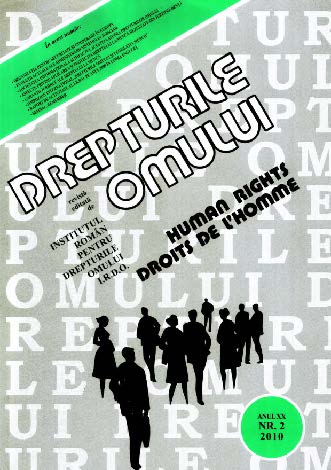Societatea informațională și impactul acesteia asupra drepturilor omului
The information society and its impact on human rights
Author(s): Radu Dan CristianSubject(s): Human Rights and Humanitarian Law, Security and defense
Published by: Institutul Român pentru Drepturile Omului
Keywords: human rights; digital information; information technology; protection of personal data
Summary/Abstract: The new computer technologies brought along some most important challenges and opportunities, which have been pointed out by those promoting and defending human rights and the protection of social vulnerabilities. In order to define the issues related to the actual existence of bidirectional relations and determinations between human rights and a society highly dependent of digital information, one should take into account the profound connections characterizing this symbiosis seen in the framework of the dynamic development of present day information technologies. The field of human rights deals, in general, with the concept of inequities among individuals, and could be defined as the society’s response to the unfair treatment applied to the latter. The notion of human rights implies mankind’s duty to protect the universal, inviolable, inalienable rights of all persons that has gradually developed into an acknowledged heritage for the future generations. Such acknowledgement has invested them with international competence, legislative consecration and stability. On the other hand, the information society is mainly characterized by the omnipresence of information technology and the dynamic development of the infrastructure of computer networks, which represents the blueprints of present day stage of development in the field of information and communication technologies (ICT). Under present circumstances, the debates on human rights and the information technology have gone beyond the topic of the right to privacy and the protection of information, and come to include such issues as the way of life and the way we are governed, encryption of the messages exchanged by means of the IT networks, the competent authorities’ right to access any databases for activities related to the national security, annihilation of terrorism, and fighting against criminal organizations. The Internet has nowadays become a force at world level and, as a preoccupation in the ensemble of social activities, it has had a considerable impact upon the way human rights are understood and implemented, no matter the users’ attitudes. The Internet has increasingly become a means for the promotion and the protection of human rights, being used to obtain, to communicate and to disseminate information of interest. On the other hand, the relationship between human rights and the Internet has not always been benefic, as it also provides the opportunity to disseminate documents which, by their negative content, prejudice these norms, violating the rights and the fundamental freedoms. Thus, the content of the messages and documents propagated to the cyberspace can violate people’s privacy, the protection of personal data, the intellectual property, or can threaten persons, etc. It can be said that the new information technologies are likely to represent one of the biggest challenges for mankind. But this global instigation compels mankind to consider whether it can survive in the absence of a global legislation in the field, one that should prevent crimes with devastating social effects. Therefore, the Internet needs a global regulation, a pertinent one, reflecting both the technological inefficiencies in terms of security and the juridical ones entailed by the dynamic developments in the field of ICT.
Journal: Drepturile omului
- Issue Year: 2010
- Issue No: 2
- Page Range: 21-37
- Page Count: 17
- Language: Romanian

